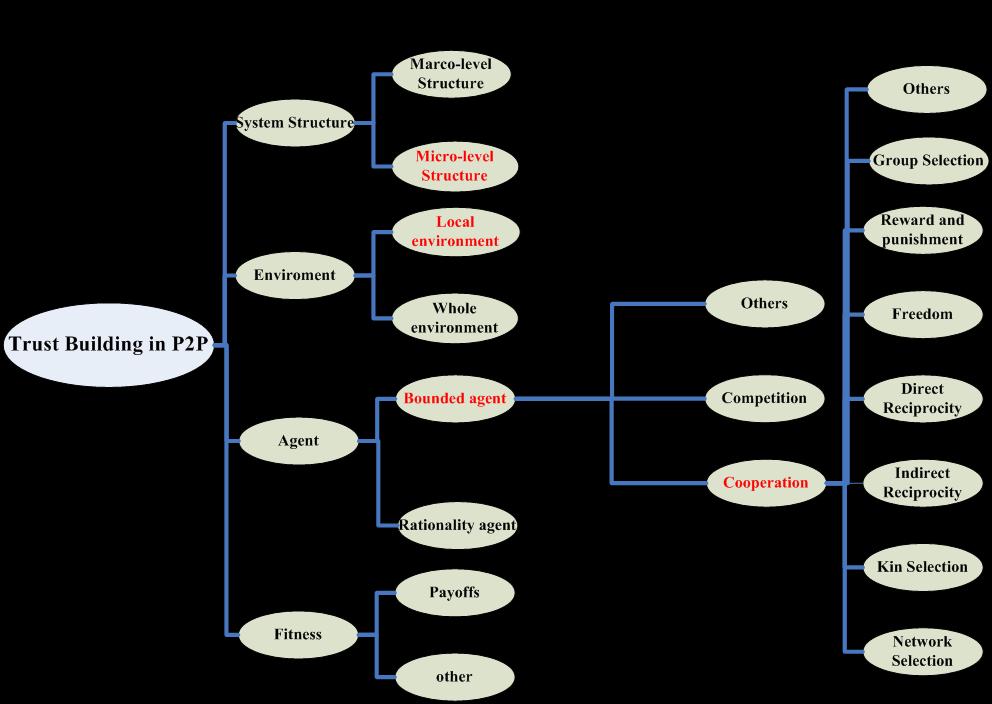P2P Trust Model
[Abstract]
With the in-depth researches of large scale distributed systems, such as
Grid computing, Ubiquitous computing, P2P computing, Ad hoc networks,
etc, system is a dynamic and cooperative model made up of multi-software
serving. Under these dynamic and uncertainty environments, trust
mechanism based on CA (certificate authority) in a regular PKI (pubic
key infrastructure) can’t adapt to these requirements. Adaptive
reputation mechanisms have proven to be essential to enforcing
cooperative behavior in open environments and become to a new and hot
topic of security research for these new distributed applications. For
trust is subjective and fuzzy, there are big differences in trust
description, evaluation, reasoning and computing in recent trust
model. However, current trust models make a number of simplifying
assumptions that may not necessarily hold in real networks, such as
either irrational or completely rational behavior, instant propagation
of reputation information and homogeneity of interactions. We argue that
dropping those assumptions and allowing more degrees of freedom is
necessary in order to construct more realistic and richer reputation
models. We support our argument by citing reputation research done in
economics, evolutionary, psychology, biology, sociology and so on, and
consider models that take into account adaptive behavior changes,
co-evolution of behavior, bounded rationality, and so on. We focus on
constructing more realistic and less constrained reputation models that
can potentially lead to construction of more secure, responsive, and
cooperative networks.

- Yizhi Ren, Mingchu Li, Cheng Guo, Yongrui Cui, Kouichi Sakurai,
Trust Similarity Measure in Trust Model for P2P Networks, Accepted
by The 2008 IEEE/IFIP International Symposium on Trust, Security
and Privacy for Pervasive Applications, to appear .
- Mingchu Li, Yizhi Ren, Kouichi Sakurai, Yongrui Cui, Zhihui
Wang. Granularity Considering in Trust Model for P2P
Networks. Proceedings of the 22nd International Conference on
Advanced Information Networking and Applications - FINA Workshops,
pp.307-312, March 2008.
- Mingchu Li, Yongrui Cui, Yizhi Ren, Yuan Tian. Intelligent
Security Multi-agent Framework in Grid Computing. Proceedings of
2008 IEEE International Conference on Networking, Sensing and
Control (ICNSC 2008), pp 1142-1147, April 2008.
- Yongrui Cui, Mingchu Li, Yzhi Ren. A Scalable and Robust
Reputation System for Grid (in Chinese). Accepted by Mini-Micro
Systems [J].2008, to appear.
- Mingchu Li, Bo Chen, Yizhi Ren. Modified Credential Chain
Discovery Based On Trust-Worthiness (in Chinese). Accepted by
Computer Engineering [J], to appear.
- Yongrui Cui, Mingchu Li, Honggang Hu, Yizhi Ren. A
Trustworthiness-Based Access Control Model for Grid Virtual
Organizations (in Chinese). Accepted by Journal of Computer
Science [J]. 2008, to appear.
- Yizhi Ren,Mingchu Li,Cheng Guo,Yongrui Cui,Kouichi Sakurai . A
Fine-grained Trust Model for P2P Networks. COMPUTER SECURITY
SYMPOSIUM (CSS 2008), Okinawa, Japan.
- Yizhi Ren, Mingchu Li, Cheng Guo, Yongrui Cui, Kouichi
Sakurai. Stochastic Dynamics of Trust Structure in P2P
Networks. Workshop among Asian Information Security Labs (AWIS
2008), Dalian, China.

